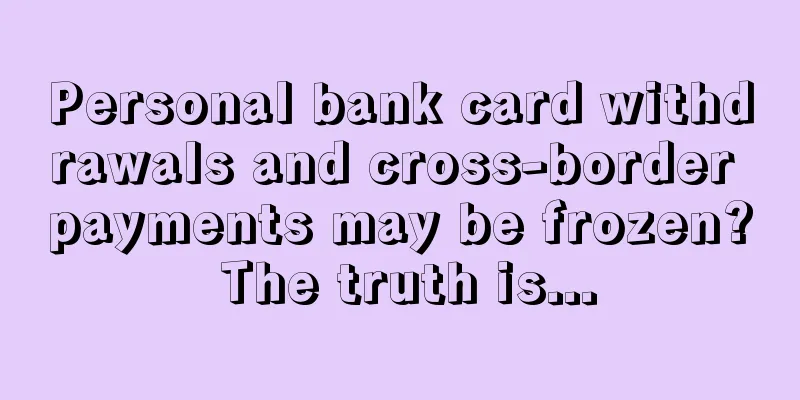Personal bank card withdrawals and cross-border payments may be frozen? The truth is...

|
In the past two days, the cross-border circle has been discussing whether personal bank cards will be frozen due to cross-border foreign exchange settlement. The matter originated from a cross-border seller's personal information sharing. After the news was released, it quickly spread in the industry. Many sellers analyzed and speculated on the possible reasons for the freezing of their bank cards, and worried that if the regulatory policy changes, the same thing will happen in large numbers, which will cause heavy damage to small and medium-sized cross-border sellers.
The sellers quickly inquired about the banks where they opened accounts and the third-party payment platforms they used, and most of the responses they received were that personal bank cards could normally receive payments from third-party payment accounts, and that freezing cases had not occurred on a large scale. Only a few bank cards were frozen for other reasons.
It is very common for cross-border sellers to accept cross-border payments with personal cards, which poses certain compliance risks. With the continuous development of the industry and the upgrading of supervision, financial and tax compliance of cross-border sellers has become an inevitable trend. How to do this homework well? A financial and tax professional from a leading seller company shared a few points.
Some sellers reported that their personal bank cards were frozen for foreign exchange settlement.
In the early morning of February 13, a Shopee seller posted on Weibo that his Ping An Bank card was frozen on the 12th. He called to inquire about the reason and was told that it was a new round of card-cutting operations by relevant departments. He then went to the bank where he opened his account to learn more. The bank informed him that because his personal card had received funds from a third-party payment account of a cross-border e-commerce company, the other party's public account transferred the funds to his personal card. In order to prevent money laundering activities, relevant departments froze personal cards for such cross-border transactions.
The seller said that the frozen bank card can only be closed and cannot be opened in the same bank within 5 years. The teller said that he was the seventh customer whose account was closed for this reason. The seller concluded that in the future, cross-border e-commerce payment settlement can only be withdrawn to the company's public account and then transferred to a personal bank card bank.
A single stone can cause a thousand ripples. The information in the blog post has set off alarm bells in many sellers. Some have questioned the authenticity of the incident itself, while others think it is nonsense that payment settlement can only be withdrawn to a public account. There are many different opinions at the moment.
Some sellers said that there are indeed cases where personal bank cards are frozen due to cross-border cash withdrawals.
A Guangzhou seller said that the relevant departments' card-cutting operation started in July and August 2020. Perhaps because of the large amount of payments, he had encountered the freezing of his Ping An bank card more than a year ago. "I can take out the money that was frozen before, but I can't apply for a bank card from Ping An within 5 years. If the payment is large, individual sellers still need to make plans and don't act recklessly."
Another seller had a very similar experience to the source seller. "I have a China Construction Bank card. At first, I couldn't make online transactions. I thought it was a system failure. Later, I went to the counter to inquire. They said that there was a public account that frequently traded with my private account. The system suspected that I was suspected of money laundering, so the card was frozen." The seller thought that he had used this card to bind a third-party payment tool for cash withdrawal. After that, he contacted the bank to explain the transaction motivation, and it has now been unfrozen.
A seller in Dongguan said that he encountered a similar situation at the end of last year. About 10 bank cards, including those of his colleagues, were frequently disconnected. The cards were opened by Bank of China and the four major banks. Fortunately, his bank card was not cancelled, and the matter was resolved after he went to the branch to sign an agreement not to launder money or lend out accounts. The seller speculated that this may be related to the fight against cross-border money laundering.
There are more than one or two sellers with similar experiences, and anti-money laundering supervision seems to be becoming stricter:
——"If you encounter this, you need to go to a bank branch and sign an agreement not to launder money or lend your account." ——"We also encountered this problem. We were not sure whether it was caused by the collection of payment. We went to the customer service of the business hall to help fix it, but they did not tell us the reason for the freeze. I was confused." ——"I received a call from the bank when I was withdrawing money today... There have been a lot of stock transfers recently, and they are asking what each one is for. I need to optimize it quickly. I'm scared."
At present, the most concerned issue for sellers is: Can personal bank cards really not be used to receive cross-border payments? Will freezing incidents occur on a large scale? Some sellers admit that it is very common to use personal cards to receive payments in the cross-border circle. If cross-border withdrawals to personal cards are subject to inspection, it will be difficult to do cross-border business.
Personal cards can normally receive cross-border payments
The Shopee seller mentioned above said that he used a third-party payment platform to receive payments, and used his personal Ping An bank card for settlement in the past year. He received payments twice before the card was suspended, totaling about RMB 4,000. So what could be the reason for the seller's bank card being frozen? Can personal bank cards still be used to receive cross-border payments?
In fact, sellers generally believe that individual cases of cross-border cash withdrawals being frozen may be caused by extreme reasons, and will not break out on a large scale. One seller pointed out: "If it is true, the collection agency will definitely force everyone to bind their public accounts first, otherwise they will not pay out."
Many sellers have asked the staff of the third-party payment collection company about this, and they all received positive answers. "This morning, when I consulted the account manager about the handling fee, I also consulted about this matter. They said that they support withdrawals to public account cards or personal cards under the name of the legal person." "I have consulted the bank and the payment collection agency, and the reply is roughly as follows: There is no saying that public accounts cannot be transferred to personal accounts. If the bank card is frozen by the State Administration of Foreign Exchange due to abnormalities, it will be unblocked if you can provide transaction records and prove legal income. It is recommended that you bind the payment card to the backend."
Another industry insider also spoke out, saying that people should not believe such words. "There is a special foreign exchange settlement for cross-border RMB Internet trade e-commerce in the national policy. Any third-party payment with a license has this authority. Unless it is a very unpopular third-party payment company that dares to do foreign exchange hedging. In addition, capital flow and tax flow or tax compliance are two concepts. For example, if you use a personal card to receive 10 million yuan, as long as you declare and pay taxes, the tax bureau will have no objection. It just violates the relevant regulations of the People's Bank of China, so don't be scared by too much intimidation marketing. Of course, if conditions permit, try not to use personal cards to receive payments."
In addition, some sellers believe that large and high-frequency inflows and outflows of funds are relatively easy to cause risk control, from withdrawing money from payment platforms to freezing personal cards.
According to feedback from banks, payment platforms and industry insiders, private cards can normally receive payments from third-party payment accounts, and the cases mentioned by the source seller have not yet occurred on a large scale. If there are abnormalities in the bank account, the seller will cooperate with the bank to sign relevant agreements and provide explanations, and the account will most likely be unfrozen quickly.
Not all personal bank card settlements will have problems, but if there are some problems with personal bank card settlements, it may be frozen. For example, if the personal bank card is a black card, the transaction is abnormal, the phone number is invalid, there are related spot checks, and NVP login abnormalities, etc., the bank card will be frozen.
In fact, if there are any updates to the cross-border payment policies, both the payment agencies and banks will act one step ahead of the sellers and be ahead. Sellers do not need to be too anxious at this moment and can just keep a calm mind.
Will there be restrictions on foreign exchange settlement using personal cards?
Een.com conducted a random survey on multiple sellers, and most cross-border sellers said that they were using personal bank cards to settle foreign exchange.
Amazon migrant workers, who are sellers, said that there are definitely many sellers who use personal cards to settle foreign exchange. As for the Amazon platform, you can open an account with a personal ID card in the past. Medium-sized and large sellers also use employee information and personal ID card information to open an account. Not all of them register a company. After all, it costs money to run a company, and employees cannot be the legal person of a shell company. Therefore, this phenomenon is common, and even some medium-sized and large sellers cannot avoid it.
A seller in Shenzhen said that the cross-border sellers he knows generally receive payment through PayPal, but most banks do not support cash withdrawals through this method. Therefore, for cross-border e-commerce sellers, the combination of self-employed and PayPal is more common. The general route map is as follows: PayPal payment → PayPal withdrawal to the self-employed US dollar account → self-employed settlement → personal bank card.
It is common for cross-border sellers to use personal bank cards to settle foreign exchange, but some people have encountered situations where their accounts have been frozen when using personal cards to settle foreign exchange. For most sellers, how can they avoid this situation?
In this regard, Amazon migrant workers offer advice: Amazon has a payment cycle, and sellers should not settle foreign exchange too frequently, and try to avoid frequent settlement of large amounts.
After the freezing of personal foreign exchange settlement, some sellers speculated whether personal foreign exchange settlement with credit cards would be restricted. Some sellers said frankly that if personal foreign exchange settlement with credit cards was checked or restricted, there would be no need to engage in cross-border e-commerce.
Will there be restrictions on foreign exchange settlement with personal credit cards? Many industry insiders and professionals have come to the unanimous conclusion: No, at least not for now.
According to people familiar with the matter, it is impossible for relevant departments to restrict foreign exchange settlement with personal bank cards, at least for now. If they supervise this aspect and adopt a blind one-size-fits-all approach, this will run counter to the country's original intention of supporting the development of small businesses and encouraging the development of cross-border e-commerce.
A financial and tax professional from a leading retail company in the industry said that he subjectively felt that there was a possibility that personal bank card foreign exchange settlement would be restricted, but that was not necessarily the case because the matter involved many small and medium-sized enterprises, or many small and medium-sized sellers. At present, the attitude of relevant departments towards SMEs is still mainly inclusive supervision, so they may not impose strict restrictions. However, inclusive supervision has certain limits. SMEs should understand that when your company reaches a certain scale, you must do a good job of compliance. Whether it is tax or foreign exchange regulatory requirements, this is the obligation of the company. If the company does not pay attention to these aspects when it reaches a certain scale, problems will definitely arise.
The person further stated that in fact, the operation of converting foreign exchange into personal bank cards is inherently problematic.
First, if we look at it from a completely standardized perspective, when doing business, a company must settle its accounts in a public account. This is the basic regulation of the People's Bank of China. Except for self-employed individuals, once a personal account is used, it will involve a violation of the basic banking law.
Secondly, there are actually some problems with taxation, because if someone uses a personal account to conduct company business, then it is very likely that it is to reduce the company's cash flow, and the purpose of reducing the company's cash flow may be to reduce some tax costs.
Therefore, for cross-border sellers, if the scale is small, the relevant regulatory authorities may not notice it. However, if the company is large enough, the current regulatory means are very advanced, using big data AI intelligent analysis, including some network tools, this is actually very easy to check.
Amazon migrant workers, who are sellers, also said that once a company grows to a certain size, it must make normal financial and tax declarations. It is not possible for someone to have millions or tens of millions of dollars in revenue each year and yet make low declarations in tax returns.
Cross-border sellers should have financial and tax compliance awareness
As the above-mentioned insiders said, the reason why most cross-border sellers use personal bank cards to settle foreign exchange is to avoid taxes to a certain extent, and this statement is also recognized by most of the peers. One of the cross-border sellers said frankly, as far as I know, entering the money into private accounts is to pay less tax.
Not long ago, an e-commerce company near South China City was investigated for under-reporting. It is understood that the company had an annual turnover of 7 million. According to the Tax Collection and Management Law, the company should pay 230,000 yuan in value-added tax, 24,000 yuan in corporate income tax, and 16,000 yuan in urban maintenance tax.
However, in order to evade taxes, the company reported zero income to the tax bureau. Such blatant behavior would certainly not escape the supervision of relevant departments. In the end, the tax bureau determined that the company had engaged in tax evasion. In addition to requiring it to pay the evaded taxes, it also imposed a fine of about 160,000 yuan according to the regulations of a 60% fine for underpaid taxes. In the end, the e-commerce company had to pay 430,000 yuan in taxes!
In response to this, sellers in the industry said that with an annual turnover of 7 million, the current profit is ridiculously low. I wonder if the company’s profit is only 430,000?
For most sellers, under-declaration is to hedge the profits of the company to a certain extent. Especially in the past two years, due to the continuous increase in various commissions and advertising fees on the platform and the continuous soaring of logistics costs, the profits of many sellers have been affected to a certain extent. In addition, many sellers have flocked to the cross-border e-commerce track, and the competition among platform sellers has become more and more fierce. In order to maintain the sales and ranking of products, some sellers have started price wars, and the internal competition among sellers has intensified. The competition among them has gradually escalated into a "war" that sacrifices profits .
In the case of declining profits, sellers may hedge in other ways. The company that was fined for under-declaring saved some profits at the time, but it also had to bear the corresponding punishment when it was discovered.
In order to avoid paying extra fines when being caught, cross-border sellers must pay attention to compliance issues, especially when sellers develop to a certain stage, financial and tax compliance issues cannot be ignored.
How do cross-border sellers manage their finances and taxes in compliance? A finance and tax professional from a leading seller company shared the following opinions:
First, cross-border sellers should comply with financial and tax regulations as soon as possible. Some companies may not be able to bear the cost of compliance in the early stages of their business, but once they have the ability, they must comply as soon as possible, because non-compliant business models will leave companies with risk exposure, and this risk exposure will continue to accumulate as the business time and scale expand, and the accumulation rate will become faster and faster.
Second, cross-border sellers must be willing to invest sufficient resources in compliance. Professionals must be responsible for implementing this matter, whether it is setting up professional positions internally or finding professional service agencies externally. This will definitely require a certain amount of investment, but this investment is necessary for the long-term stability and development of the company.
Third, companies should have the right values and should not regard tax compliance as a burden. Companies should accept it from the root and not always think about reducing costs through tax planning or tax avoidance, or relying on tax avoidance to gain competitive advantages. This idea is actually quite dangerous and will definitely cause problems over time.
Third, in the past two years, the trend of strengthening social control and audit by European and American tax authorities is very obvious. From last year, we have seen that tax audits in various countries are tightening. So from the industry's perspective, some non-compliant practices may have been acceptable in the past, but the risks will increase in the future.
E-commerce is particularly unsuitable for taking tax risks, because the risks are inherently greater than those of other businesses. E-commerce data is permanent, and all data is left on e-commerce platforms, funding platforms, or trading platforms. If an organization conducts an audit, it can be obtained very quickly and completely, and the traceability is very strong, so e-commerce itself faces a relatively high audit risk.
In addition, information technology is developing very rapidly, and countries have very strong capabilities in financial and tax supervision. The use of information technology for analysis is also very efficient, and this technology is constantly improving.
Cross-border sellers should have seen the tightening of tax inspections by European and American tax authorities. Recently, Zebao Technology and its founder were sued by its parent company Xinghui Shares. The main reason was that Zebao's overseas subsidiaries were pursued for taxes by the US, German and French tax authorities, and the unpaid and overdue taxes totaled up to 50 million RMB.
Xinghui Co., Ltd. acquired Zebao Technology in 2018. Prior to this, Zebao disclosed that it had four subsidiaries operating overseas. These four subsidiaries owed large amounts of taxes, most of which were owed before 2018. For this reason, Xinghui Co., Ltd. sued and required the original founder of Zebao Technology and its concerted actors and other seven parties who bet on the restructuring performance to pay RMB 49,195,568.54 and all litigation costs of the case.
The fact that large cross-border sellers fail to pay taxes in compliance has been noticed by the European and American tax authorities. Once caught, not only will the owed taxes have to be paid in full, but they may also face large fines. Other large-scale cross-border sellers that fail to pay taxes in compliance may also be hard to escape the inspection of the European and American tax authorities.
Next, financial and tax compliance for cross-border sellers will definitely be an inevitable trend. Especially for sellers of a certain scale, the risk of non-compliance will become increasingly greater. Amazon Receiving Payments freeze |
<<: Brexit puts e-commerce business in trouble, with exports down 41%
>>: TikTok tests age-rating content restrictions
Recommend
eBay Germany launches ebay-FIEGE shipping service to speed up delivery times
German eBay Marketplace sellers can now choose sa...
What is voghion? voghion Review, Features
1. About Voghion Voghion is an emerging cross-bor...
Amazon “buys” user data, will sellers’ CPC advertising be a winner?
According to foreign media reports, some Amazon u...
Spider-Man becomes an influencer online, sales of peripheral products in Australia surge 338%
Spider-Man has become the new online influencer w...
What is pencils? pencils Review, Features
Pencils was registered in 1996 and is a cedar penc...
What is Negative keywords? Negative keywords Review, Features
Negative keywords are a great way for Amazon sell...
Amid the impact of the epidemic, are e-commerce subscription services still popular?
Previously, the media reported that 98% of online...
The first quarter results were collectively handed in, and most of the big sellers increased revenue but not profit
Recently, Internet giant Amazon released its firs...
Product infringement defendant, multiple platform sellers collectively respond to rogue law firm lawsuit
Recently, a seller reported to Yien.com that a la...
What is Pan Asia International? Pan Asia International Review, Features
Pan Asia International (Shandong Pan Asia Internat...
Ula receives $20 million in Series A funding to integrate Indonesia’s retail market
However, as in other Asian markets, most small re...
What is MF Free Review? MF Free Review Review, Features
MF Free Evaluation is the first Amazon cross-borde...
What is JuDe Intellectual Property? JuDe Intellectual Property Review, Features
Guangzhou Jude Management Consulting Co., Ltd. is ...
Revenues soared 240 times as spring and summer travel products are hot on Amazon
Since the outbreak of the epidemic, people's ...
What is China Cross-border E-commerce Fair? China Cross-border E-commerce Fair Review, Features
The China Cross-border E-commerce Fair, with the t...









